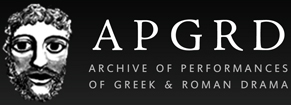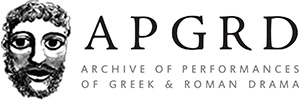The APGRD was founded in 1996 with a three-year Leverhulme grant to study the history of performances of Greek and Roman plays from 1500 to the present day. Shakespearian scholars had long noted that performances had considerable bearing upon scholarly discussion, yet there was no comparable scholarly focus on the performance history of Greek and Roman plays, nor indeed was there a centre comparable to the Shakespeare Institute in Stratford-upon-Avon to house the material evidence of these histories.
It soon became increasingly evident that the start date of the project was not just arbitrary but highly restrictive as well. Two five-year AHRC grants enabled the APGRD to broaden the scope of its research. The start date of 1500 was not simply limiting because the term ‘Renaissance’ had recently come under increasing scrutiny from wide quarters – ignoring as it does the uninterrupted tradition of ‘classical learning’ that was sustained in Byzantium and the Arabic and Syriac scholarly traditions, especially Baghdad. This was also the case because of the growing awareness of the rich performance tradition of the ancient plays in antiquity - from almost immediately following the first performances in 5th-century Athens until beyond St Augustine - not only in the tragic theatre but in comedy, mime, dance and sung recital, which cried out to be told. As a result, the APGRD expanded its field of study to include performances from antiquity.
In addition, the APGRD went on to study other types of staged performance. The early (well-documented) performance history of opera is inextricably linked to Greek tragedy and the APGRD has undertaken a rigorous and systematic study of operatic treatments of the ancient plays in order to appreciate the sheer breadth of influence exerted by ancient drama throughout the entire modern period. Modern appropriations of the chorus similarly cannot be considered independently of a serious understanding of the developments in dance in the modern world. Indeed, ancient information about the theatre (not just the dramatic texts themselves) - for example in anecdotes preserved in Plutarch or Philostratus, and treatises on dance by Lucian and Choricius - has exerted a continual influence on the western founding fathers and practitioners of new genres of musical theatre. The APGRD also seeks to document all danced versions of the ancient plays and is closely engaged with developments in dance history.
Since 2010 with the support of The Andrew W. Mellon Foundation and the University of Oxford, the APGRD entered a new phase. The APGRD's research has contributed significantly to the wider shift in the position of Classical Reception Studies from the periphery to the centre within the discipline of Classics itself. Housed within the Classics Centre, the APGRD is part of the vibrant research culture within Oxford Classics, while still maintaining close links with colleagues in Modern Languages, English and Music and forging new ones within other Faculties. It could also be said that the APGRD has become a de facto ‘Theatre Department’, and has brought theatre history into the study of Classics.
Research projects include:


